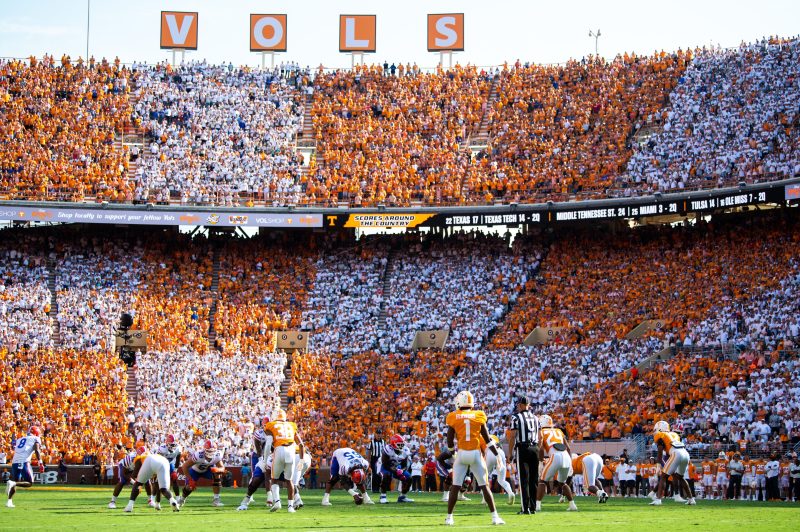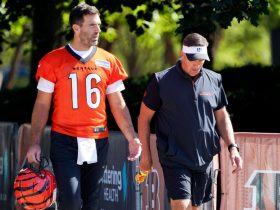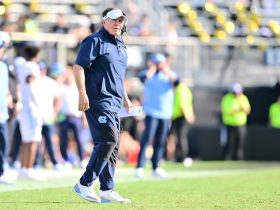The University of Tennessee will increase football ticket prices and the required donations that accompany them by an average of 14.5% in 2025 with most of the new cost going to a ‘talent fee’ to pay players.
Revenue sharing for athletes is coming to college sports as early as next year.
The richest schools will opt in by funding an estimated $22 million pool to pay athletes directly and about another $5-10 million to fund additional scholarships. The remaining schools could be left in the dust.
Tennessee is opting in, and fans will pay a portion of that cost of competition.
‘We’ve come a long way in the last few years. In this new era, it’s going to get a lot more expensive,’ White told Knox News, part of the USA TODAY Network. ‘But there’s also going to be a closer relationship between resources and competition than there ever has been before. And our biggest asset is our fan base.’
Here’s the breakdown of the average 14.5% price increase of tickets at Neyland Stadium in 2025:
- Initial average increase of 4.5% per seat on single-game tickets and season tickets plus donations. Some will be higher, some lower. That increase accounts for Tennessee’s rising costs for construction, food, travel and other athletic department expenses.
- An additional 10% increase per seat on all single-game tickets and season tickets plus donations as a ‘talent fee’ to fund the revenue-sharing pool for athletes coming as early as 2025.
Season ticket renewals will begin Thursday, and the renewal deadline is Feb. 27, 2025. Tennessee is offering a 10-month payment plan to help fans absorb the cost increase.
Paying Tennessee players, extra scholarships could cost $30 million
The details of revenue sharing aren’t known yet because they’re contingent on the settlement of the House v. NCAA federal antitrust case, which is still amid negotiations. Revenue sharing could go into effect as early as July 2025.
But generally, schools will have the option of funding up to 22% of their annual revenue, or about $22 million, to pay athletes. It could work sort of like a salary cap for college sports, but that structure is also murky.
All SEC and Big Ten schools are expected to opt in to the revenue-sharing model, and some schools from weaker conferences will attempt to keep pace.
Paying athletes for their name, image and likeness could still be a factor in landing and retaining top players. But NIL’s place in a revenue-sharing model is uncertain.
The cap on scholarships also will rise as early as July 2025. Football can go from 85 scholarships to 105. Baseball can go from 11.7 scholarships to 35, and so on.
Many schools won’t be able to fund those extra scholarships unless they drop some sports.
For schools like Tennessee that are opting in, it will require about $30 million annually to both fund revenue sharing and additional scholarships. That’s where UT’s ticket price hike comes in.
‘It’s really a $30 million-plus math problem,’ White said. ‘We’re not just offloading it to our fans. We are asking them to help us with a portion of it.’
How ticket price hike will fund portion of player pay
Tennessee estimates the 10% ticket price increase for a ‘talent fee’ will account for $7.5 million, or about one-third of the annual $22 million revenue-sharing pool to pay athletes.
The university is tapping other revenue streams to keep pace with the richest schools in this new pay-for-play era of college football.
The Tennessee Fund raised $139.7 million in 2023-24, the best year in UT athletics fundraising history. That mark has increased more than $100 million in the past four years since White was hired.
And Tennessee has landed lucrative corporate sponsorships, such as the Pilot branding rights deal on Neyland Stadium. That has helped fund facility renovations and restock the athletic department coffers for this new arms race in college athletics.
Danny White believes resources produce winning
That revenue surge recently yielded White a contract extension and raise to become the highest paid AD at a public university in the country. His pay increased to at least $2.75 million with the same 5% annual increase from his original contract.
White believes resources produce winning, and his track record at Tennessee reinforces that philosophy. So it’s no surprise that he’ll lead UT into the revenue-sharing era in college sports.
In 2023, Tennessee athletics had its highest operating revenue in history at more than $200 million, exceeding the previous record by almost $50 million. And the Volunteers have won at a staggering level alongside those soaring revenues.
In 2023-24, Tennessee finished third in the Learfield Director’s Cup, the highest in school history, and captured its third straight SEC All-Sport title. It was one of two schools in a power conference to have every sport reach the NCAA postseason or a bowl game.
In March, Tennessee men’s basketball made the Elite Eight for the second time in program history. In June, Vols baseball won its first national championship at the College World Series, and Tony Vitello was rewarded with a new contract that made him the highest paid college baseball coach in the nation.
And Tennessee football is ranked in the top 10 for the second time in the past three seasons under coach Josh Heupel, whom White hired.
Tennessee is among hottest tickets in college football
White said Tennessee ticket prices are comparable to competitors in the SEC and nationally, and demand is high for the Vols.
The Vols have posted 15 consecutive sellouts. That’s especially notable considering Neyland Stadium’s capacity of 101,915 makes it the sixth-largest college stadium in the country.
Last season, Tennessee led the SEC in total home attendance (713,405) and average home attendance (101,915), ranking third and fourth, respectively, in the nation.
‘We have a waiting list of 15,000. So if we were about cold-hearted business, we would probably be a lot more aggressive with our price points,’ White said. ‘But this is college athletics, and we have a real passionate fan base.
‘We don’t take these decisions lightly. We work hard to try to thread the needle between generating the revenue we need but also being fair and reasonable.’
Adam Sparks is the Tennessee football beat reporter. Follow him on X, formerly known as Twitter@AdamSparks.







